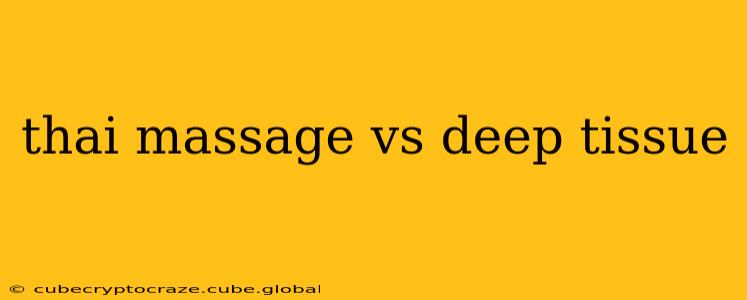Choosing between a Thai massage and a deep tissue massage can feel overwhelming. Both promise relaxation and pain relief, but their approaches differ significantly. This comprehensive guide explores the key distinctions, helping you decide which massage therapy best suits your needs. We’ll delve into the techniques, benefits, and ideal candidates for each, answering common questions along the way.
What is Thai Massage?
Thai massage, also known as Thai yoga massage, is an ancient healing art originating in Thailand. It's a unique blend of acupressure, assisted stretching, and gentle rocking. Unlike other massage styles that primarily focus on manipulating soft tissues, Thai massage involves rhythmic compressions and stretches applied along the body's energy lines, called Sen lines. The therapist uses their hands, elbows, knees, and feet to apply pressure and passively move the client through various yoga-like poses. This dynamic approach aims to improve flexibility, increase circulation, and promote a sense of deep relaxation and well-being.
What is Deep Tissue Massage?
Deep tissue massage, as the name suggests, targets deeper layers of muscle and connective tissue. This type of massage uses slow, firm strokes to address chronic muscle tension, pain, and stiffness. The therapist utilizes their fingers, thumbs, and forearms to apply deep pressure to release knots and adhesions in the muscle tissue. It’s often recommended for individuals experiencing persistent pain or limited range of motion. While it can be relaxing, the focus is primarily on therapeutic benefits.
Thai Massage vs. Deep Tissue Massage: Key Differences
| Feature | Thai Massage | Deep Tissue Massage |
|---|---|---|
| Technique | Acupressure, assisted stretching, passive movement | Deep, firm strokes, targeted pressure |
| Pressure | Varies, generally moderate to firm | Firm to deep pressure |
| Focus | Energy lines (Sen lines), flexibility, circulation | Muscle tension, pain relief, adhesions |
| Clothing | Typically performed with loose clothing on | Usually performed with minimal or no clothing |
| Movement | Client is actively involved in stretches | Client remains relatively passive |
| Ideal for | Improved flexibility, stress reduction, relaxation | Chronic pain, muscle tension, limited range of motion |
What are the benefits of Thai massage?
Thai massage offers a wide array of benefits including:
- Improved Flexibility and Range of Motion: The assisted stretches lengthen muscles and improve joint mobility.
- Stress Reduction and Relaxation: The rhythmic movements and gentle rocking promote a deep state of relaxation.
- Improved Circulation: Increased blood flow helps deliver oxygen and nutrients to the tissues.
- Enhanced Energy Levels: Unblocking energy lines can leave you feeling revitalized.
- Pain Relief: Addressing muscle tension can alleviate pain in certain areas.
What are the benefits of deep tissue massage?
Deep tissue massage is particularly effective for:
- Chronic Pain Relief: Addressing deep muscle tension and adhesions can alleviate persistent pain.
- Improved Range of Motion: Releasing muscle restrictions improves flexibility and movement.
- Reduced Muscle Spasms: Deep pressure helps relax tight muscles and reduce spasms.
- Stress Reduction: Although less focused on relaxation than Thai massage, it can still alleviate stress by reducing muscle tension.
- Improved Posture: Releasing muscle imbalances can help improve posture and alignment.
Which massage is better for relieving back pain?
Both Thai massage and deep tissue massage can be beneficial for back pain, but the most suitable choice depends on the cause and nature of the pain. If your back pain stems from muscle tension and stiffness, deep tissue massage may be more effective. However, if your pain is related to poor posture, inflexibility, or energy blockages, Thai massage might be a better option.
Which massage is better for relaxation?
If relaxation is your primary goal, Thai massage is generally considered more relaxing. The flowing movements, gentle rocking, and focus on energy flow create a deeply calming experience. While deep tissue massage can be relaxing after the treatment, the process itself tends to be more intense.
Is Thai massage good for beginners?
Yes, Thai massage can be a great introduction to massage therapy for beginners, especially if you opt for a gentler session. It's crucial to communicate your comfort level with the therapist.
Conclusion
Ultimately, the best massage for you depends on your individual needs and preferences. Consider your pain levels, flexibility goals, and desired level of relaxation when making your decision. Consulting with a qualified massage therapist can help you determine which type of massage is most appropriate for your specific condition. Remember, both Thai massage and deep tissue massage offer unique benefits, and many find value in experiencing both.
